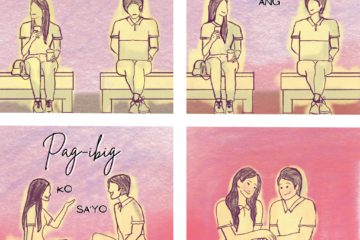KAPENG BARAKO Club is back and this time, new beans have been added to the mix.
Kapeng Barako: Samahan ng mga Bitter was given the spotlight last year when the University’s theater guild Teatro Tomasino had its first live on-stage performance since 2019.
This year, the theater guild brought back Juan Ekis’ Palanca award-winning play for a rerun, serving another brew as it explored the intricacies of love through a seven-character ensemble. Kapeng Barako: Samahan ng Mga Bitter debuted in 2010, earning Ekis the third prize in the Dulang Ganap ang Haba category in the 60th Don Carlos Palanca Memorial Awards.
Directed by Business Administration alumnus Lendro Enore for its Teatro Tomasino run, Kapeng Barako Club: Samahan ng Mga Bitter ran from March 28 to 29 and April 2 to 5 at the Thomas Aquinas Research Center and Graduate School Auditorium (TARC).
The play also found its stage in coffee shops. Some of its past runs did not adopt the traditional stage and audience distinction, allowing viewers to integrate themselves into the setting, as if they were listening in on the complex relationships the seven characters have.
Each couple managed to represent different depths of coffee (and hard liquor) beyond its usual bitterness.
Joel (Godwin de Guzman, Business Economics junior) finds it difficult to be honest with his feelings whenever he is around Anna (Caryl Catan, Tourism alumna). He struggles with hyper-acidity whenever he drinks coffee, a condition that hinders him from confessing his love for Anna.
Masi (Athena Cobey, College of Science alumna)—the rockstar of the friend group, but not so much in the field of love—is having second thoughts about her engagement with her fiancé, Ed, and is evidently waiting for Eric (Yeoj Claveria, Electronics Engineering junior) to do something about it. Having his heart broken in the past by Masi herself, Eric hesitates making any move, for despite being foolish in love, he is in constant fear of rejection.
Stef (Monica de Leon, Special Needs Education sophomore) could not let go of the past. In navigating her ambiguous relationship with coffee shop owner and playwright Marlowe (Beryl Romero, Communication alumnus), she discovers the cunning nature of the same man who would write plays about her. In the center of it all is Sunshine (Martha Vertucio, Communication freshman), a personification of her namesake whose rather sunny personality still manages to get entangled with the damaged connections of those around her.
Weaving together the conflicted relationships of those around Sunshine is Marlowe’s Beans Coffee Shop. This shop served as the main setting of the play, as its simple yet aesthetically-pleasing walls witnessed all that Ekis allowed viewers to see.
The irony is that, despite its “samahan ng mga bitter” mantra, Kapeng Barako Club’s characters all appear to believe in true love, a stark contrast to what the title implies.
Kapeng Barako: Samahan ng Mga Bitter takes its viewers to Joel and Anna’s repressed feelings for Eric, Masi’s unresolved heartbreaks and doubts on Marlowe, Stef’s ambiguous connection, and ultimately, to the vulnerability of all those involved in the story’s messy love tangles.
The play laced together themes of bitterness and coffee, using these as metaphors for the intricacies of life and the human condition. For Filipinos, the word ‘barako’ in kapeng barako denotes strength and masculinity. Ekis made use of the word’s meaning to Filipinos, alongside the flavor profiles of kapeng barako itself in illustrating their rather complex love stories.
Like the coffee known for its bold and bitter flavor, the characters in the play displayed similar ardors in their emotional struggles. They gather in a coffee shop, a simple setting alchemized into a microcosm of society, where the seven’s shared experiences illuminate the deeper issues of discontent and frustration of love that riddle the lives of many.
The actors contributed to the organized display of narratives. Their performances matched the play’s prestige as a Palanca-award winning piece. Much of the dialogue mirrored the language and messages of the time it was written in, as well as the languages and messages of today.
In the play, bitterness transcended mere emotion; it became a lens through which the characters catechized their aspirations, frustrations and relationships. Each character’s story reflected a societal reality, revealing how external strains—this time in the field of love—contributed to their collective sense of bitterness.
Ordering and drinking coffee for the seven sufficed as a ritualistic conduit for expressing these sentiments, fostering connection through the revelation of each other’s vulnerabilities.
The raw, and mostly unfiltered exchanges between the characters showed the play’s resemblance with universal experiences. The bitterness of coffee as a metaphor for the unpleasant side of love offered a deeper reflection on the human experience, furnishing a space for the viewers’ own introspection. The struggles of the characters resonate with many and remain relevant today.
Kapeng Barako Club: Samahan ng Mga Bitter the Rerun unveiled that the bitterness experienced by many is not isolated, but shared across various contexts. Through the lens of love, the theater became a transformative space where the concept of love goes beyond the surface-level meanings people assign to it.
Through this connection, the play cultivated a sense of solidarity among those who hide behind the guise of bitterness, yet are truly seeking and yearning, deep down. F – Ren Sophia Bughaw




